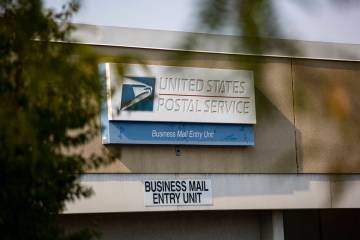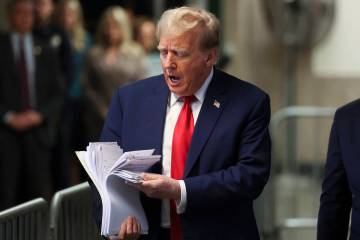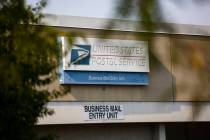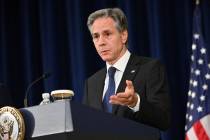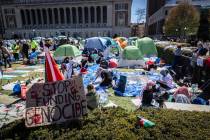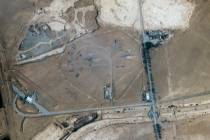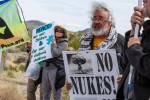Reid declares Yucca victory
Senate Majority Leader Harry Reid said he dealt a fatal blow to the funding-starved Yucca Mountain Project on Thursday, announcing that President Barack Obama and Energy Secretary Steven Chu have agreed to eliminate all money for pursuing a license for the nuclear waste disposal project in 2011.
"The only funding allocated for Yucca will be used to conclude the work being done at the site, bringing the ill-conceived project to its rightful end," Reid, D-Nev., said in a statement.
The agreement evolved after Reid cut $27 million from the project's 2010 license application funding in the Energy and Water Appropriations bill that passed Wednesday.
During a conference call with former Vice President Al Gore about next month's Clean Energy Summit in Las Vegas, Reid said the Nuclear Regulatory Commission as well won't have money to continue its four-year review of the license application that Chu's predecessor, Samuel Bodman, submitted last year near the end of the Bush administration.
"It will be terminated. There's no money and there's no way to do it," Reid said.
But killing the project outright would require an act of Congress to change the Nuclear Waste Policy Act, said Paul Seidler, senior director for the Nuclear Energy Institute, the lobbying arm of the nuclear power industry.
"All I can really say is the Nuclear Waste Policy Act is the law of the land. Until the nuclear waste policy act is changed, the law is very clear on what has to take place," Seidler said by telephone from his Henderson office.
Asked Thursday about amending the Nuclear Waste Policy Act, Reid said, "No. I don't think we have to change that."
Seidler acknowledged that Reid can influence the funding process and stop it altogether.
"But at some point in time, you have to go back and follow the Nuclear Waste Policy Act or modify the Nuclear Waste Policy Act," Seidler said.
The licensing process can be stopped and restarted, he said, and another administration could revive the Yucca Mountain Project.
"Certainly that can always happen," Seidler said.
He said the Nuclear Energy Institute has written a letter to Chu, asking that the Energy Department stop collecting money from nuclear utility ratepayers if DOE doesn't intend to go forward with its plans to entomb 77,000 tons of used reactor fuel and highly radioactive waste in a maze of tunnels in the mountain, 100 miles northwest of Las Vegas.
"The law of the land is very clear," Seidler said. "Cutting funding to the licensing process doesn't fully address the situation."
Chu's office didn't give details about the verbal agreement to which Reid alluded.
"The president opposes the Yucca Mountain Project, and that is reflected in the (fiscal year) 2010 budget and will be again in the (fiscal year) 2011 budget," Chu's spokeswoman, Stephanie Mueller, wrote in an e-mail.
She didn't respond to follow-up questions about what work needs to be concluded at the site, whether it be environmental remediation or closing permanently the five-mile exploratory tunnel in the volcanic rock ridge.
Obama's fiscal 2010 budget contained $196.8 million for the proposed waste repository. That was more than $100 million cut from this year, continuing a steep fiscal slide for the program.
The previous low for funding DOE's nuclear waste disposal program was $243.5 million, appropriated for 1991.
The 2010 budget includes funding for a commission to study alternatives to the Nevada effort. The panel, which Chu has not yet announced, is expected to take two years to make its recommendations.
Earlier this month, Reid said asking that the Department of Energy withdraw the license application wasn't in his immediate plans. "I don't know why we need that," he told the Review-Journal.
On Thursday, Reid said there is no hurry to put nuclear waste in a repository anywhere.
"I'm convinced that for the foreseeable future, the next 50 to 100 years, we'll simply store the spent fuel rods on-site.
"We don't have to worry about transportation, because that's where it gets dangerous. ... I'm not opposed to nuclear power but it's pretty expensive. But if you produce nuclear power, you just leave it where you produce the energy," Reid said about highly radioactive waste.
Contact reporter Keith Rogers at krogers@reviewjournal.com or 702-383-0308.





